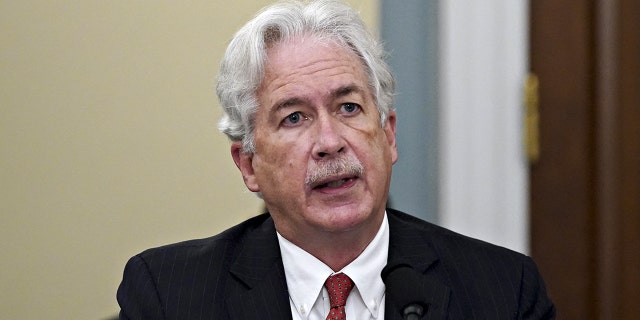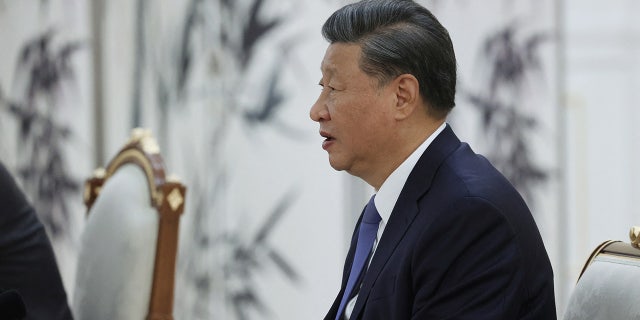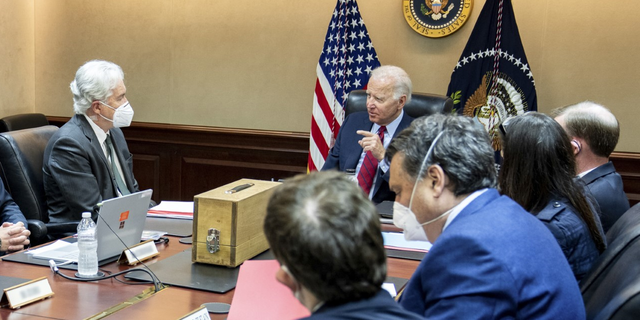Brooke Singman
CIA Director William Burns called Russia a "declining" power in the first episode of the intelligence agency's new podcast, while warning that China is a "central geopolitical challenge" for the U.S.
The CIA's podcast, "The Langley Files," launched Thursday and featured Burns as its first guest.
The podcast comes during the CIA’s 75th anniversary — a time, Burns said, for the agency to "reflect on how we need to organize ourselves to navigate successfully what is an incredibly complicated international terrain."
Burns warned that terrain features a "major power competition with rising powers like China," which he referred to as a "central geopolitical challenge."

CIA Director William Burns testifies during a House Intelligence Committee hearing about worldwide threats on Capitol Hill in Washington, D.C., on April 15, 2021. (AL DRAGO/POOL/AFP via Getty Images)
Burns pointed to the CIA's formation of the China Mission Center, which was created to counter Beijing and "best position" the agency to address current and future national security challenges posed by China.
Earlier this year, Burns warned that China's Xi Jinping has even served as a "silent partner" in Russian President Vladimir Putin's aggression in Ukraine.

Chinese President Xi Jinping talks to Russian President Vladimir Putin during a meeting on the sidelines of the Shanghai Cooperation Organization summit in Samarkand, Uzbekistan, on Sept. 15, 2022. (Sputnik/Alexandr Demyanchuk/Pool via REUTERS)
"We have to deal with declining powers, not just rising ones, like Russia," Burns said. "And Putin demonstrates every day that declining powers can be at least as disruptive as rising ones."
Burns pointed to Russia’s war in Ukraine and stressed the importance of CIA intelligence.
"We were able to paint a pretty clear picture of Putin’s plans to mount a major new invasion of Ukraine last fall, months before he actually launched that invasion on the 24th of February," Burns explained. "That enabled us to help Ukrainians defend themselves. It helped us to build allied unity."
Russian President Vladimir Putin chairs a meeting on the country's transport industry via a video link in Sochi, Russia, on May 24, 2022. (Sputnik/Mikhail Metzel/Kremlin via REUTERS)
"It helped to expose the fact that what Putin was about was a naked, unprovoked aggression, and we reinforced that by the President’s decision to declassify some of our secrets as well," he said.
Burns was referring to intelligence declassified by President Biden earlier this year that revealed Putin’s plans to stage false flag attacks to serve as a pretext for an invasion of Ukraine.
Meanwhile, Burns pointed to the "successful" U.S. counterterrorism operation in Afghanistan that killed the leader of al Qaeda, Ayman al-Zawahri, last month, a strike that degrades the terror network's ability to operate.
But Burns said the U.S. still faces "the continuing challenge of terrorism."
"It may take different forms today than it did over most of the last 20 years, but it’s still a significant challenge," he said. "We still have significant capabilities at this agency working with partners across the U.S. government, and that’s going to be another of our most important priorities."

President Biden is shown on July 1, 2022, during a meeting "to discuss the counterterrorism operation to take out Ayman al-Zawahri." (White House)
He added: "It’s a balancing act, is what it’s going to be."
Burns went on to say that "ingenuity and dedication" are critical to the work of the CIA, but also stressed that the agency is "apolitical."
"[O]ur job is not to bend intelligence to suit political party or policy preferences or agendas. It is to deliver the best intelligence that we can gather, the best analysis that we can put together, with honesty and integrity," Burns said. "Our job is to tell policymakers what they need to hear, not what they want to hear."
Burns, who has worked under six presidents and both Republican and Democratic administrations, said that without working in an apolitical manner, "we only get ourselves in trouble as a nation, and we make bad policy choices, when we forget those very basic truths."
As for the CIA's decision to launch the podcast, Burns acknowledged that intelligence agencies are "supposed to collect secrets and keep them and not talk too much about them."
"We do usually operate in the shadows, out of sight and out of mind," he said. "Our successes are often obscured, our failures are often painfully visible, and our sacrifices are often unknown."
"We have a profound obligation to protect agents and officers who risk their lives in support of our mission, which is to help protect Americans," Burns continued. "But I’m convinced, as I know you are, that in our democracy, where trust in institutions is in such short supply, that it’s important to try to explain ourselves as best we can and demystify a little bit of what we do."
No comments:
Post a Comment